Unit 1 I went to Sanya for my holidays Lesson1 课件
文档属性
| 名称 | Unit 1 I went to Sanya for my holidays Lesson1 课件 |  | |
| 格式 | zip | ||
| 文件大小 | 1.6MB | ||
| 资源类型 | 教案 | ||
| 版本资源 | 人教精通版(三年级起点) | ||
| 科目 | 英语 | ||
| 更新时间 | 2016-04-02 20:08:52 | ||
图片预览






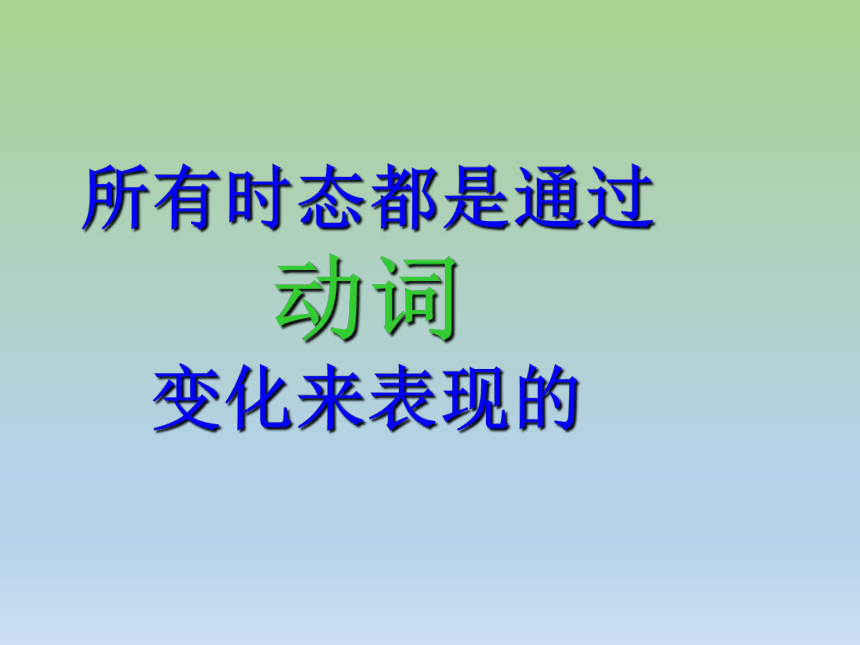
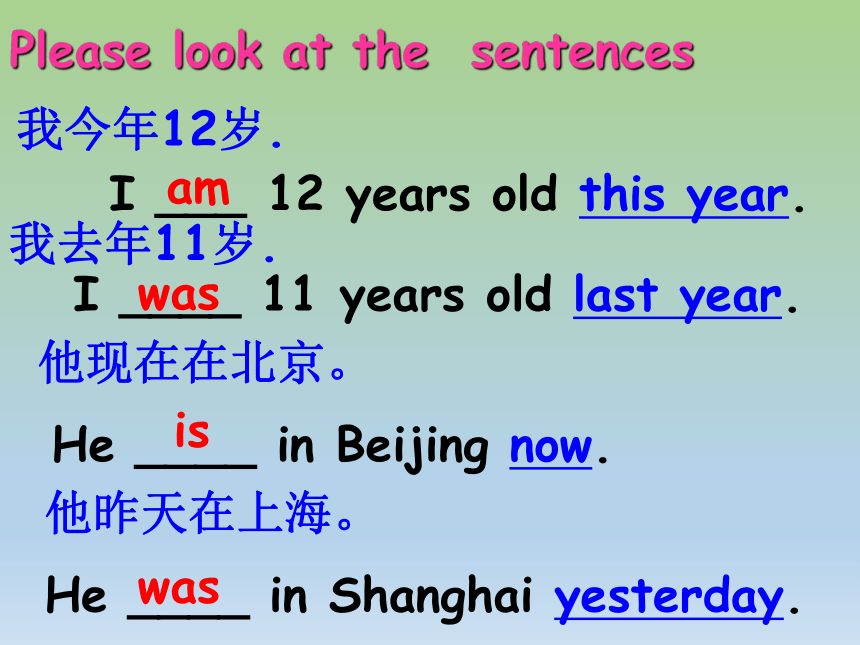
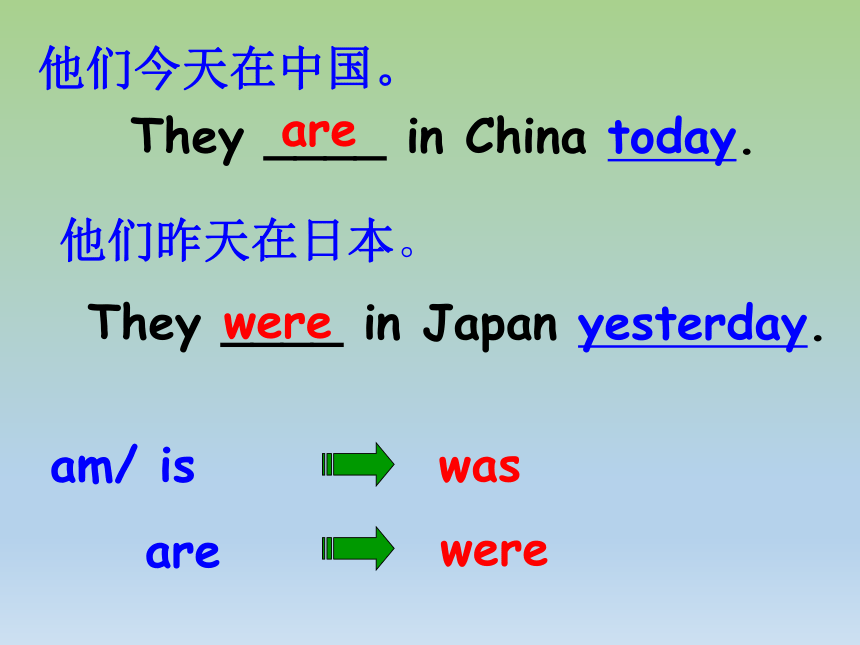
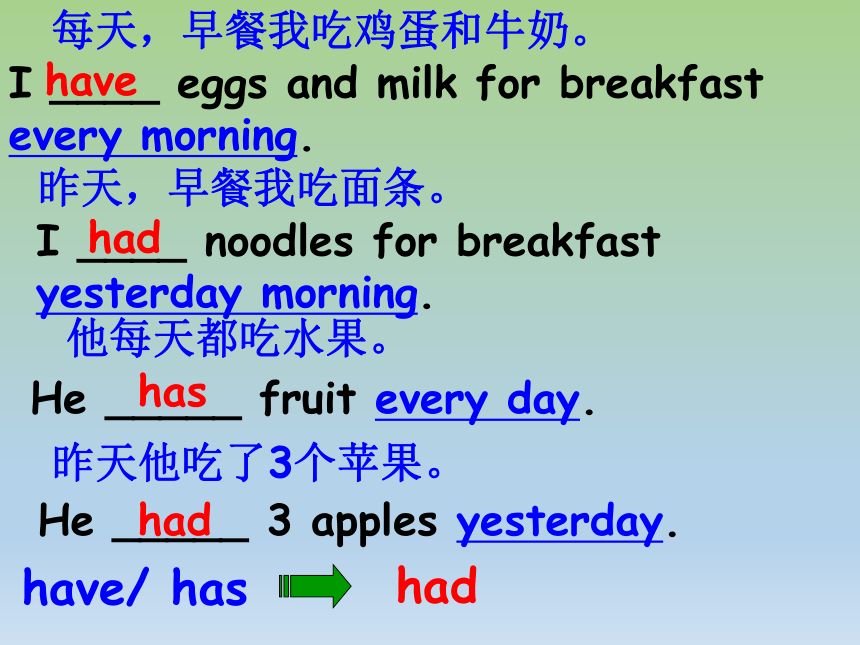
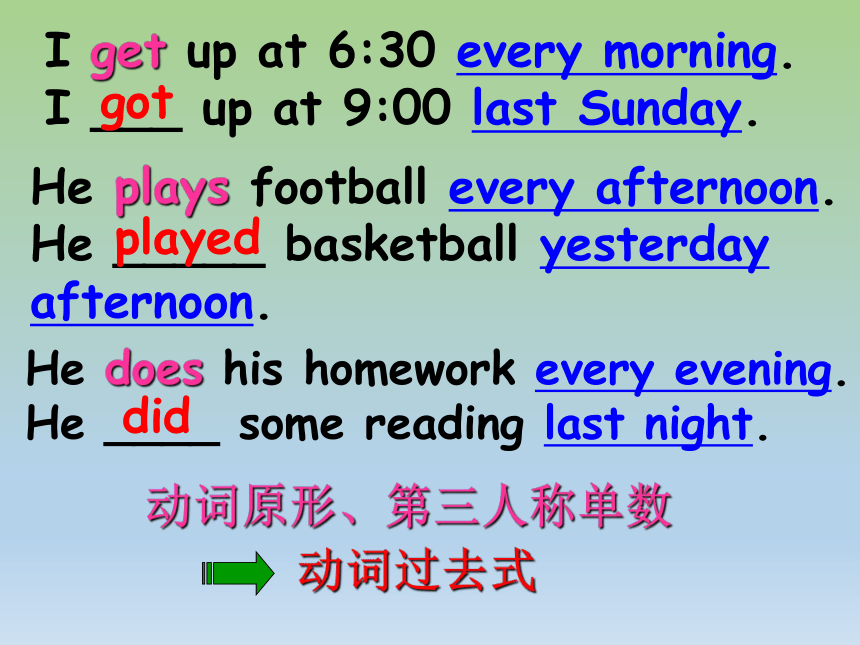
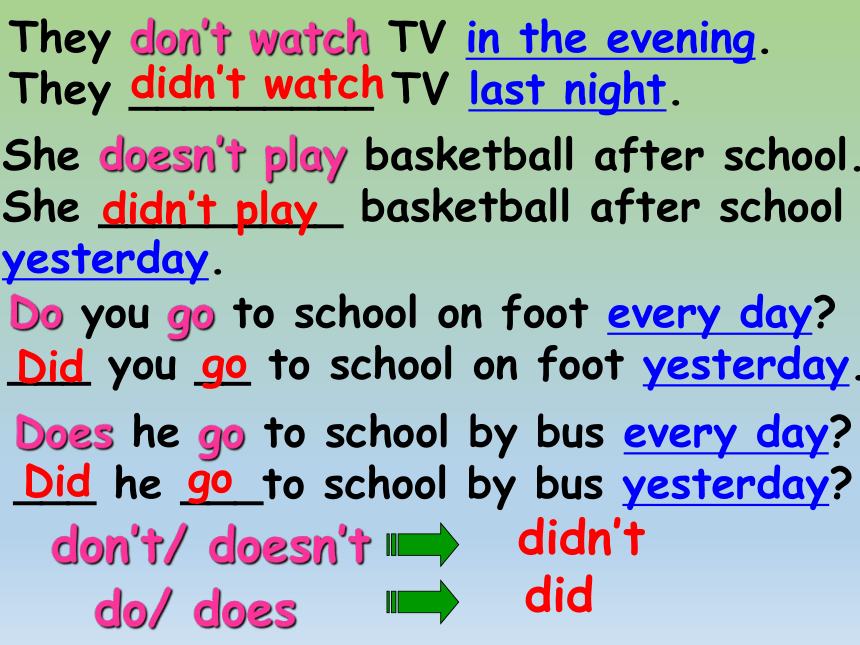
文档简介
课件42张PPT。Unit 1
I went to Sanya for my holidays一般过去时态什么是一般过去时?动词的一般过去时态表示过去发生的
动作、情况或存在的状态。行为动词(即实义动词)的过去式没有人称
和数的变化。所有时态都是通过
动词
变化来表现的I ___ 12 years old this year. 我去年11岁.I ____ 11 years old last year.He ____ in Beijing now.他昨天在上海。He ____ in Shanghai yesterday.他现在在北京。Please look at the sentences我今年12岁.amwasiswasThey ____ in China today.他们今天在中国。They ____ in Japan yesterday.他们昨天在日本。areweream/ iswasarewere每天,早餐我吃鸡蛋和牛奶。I ____ eggs and milk for breakfast every morning.昨天,早餐我吃面条。I ____ noodles for breakfast yesterday morning.他每天都吃水果。He _____ fruit every day.昨天他吃了3个苹果。He _____ 3 apples yesterday.have/ hashadhavehashadhadI get up at 6:30 every morning.
I ___ up at 9:00 last Sunday.He plays football every afternoon.
He _____ basketball yesterday afternoon.He does his homework every evening.
He ____ some reading last night.动词原形、第三人称单数动词过去式gotplayeddidThey don’t watch TV in the evening.
They _________ TV last night.She doesn’t play basketball after school.
She _________ basketball after school yesterday.Do you go to school on foot every day?
___ you __ to school on foot yesterday.Does he go to school by bus every day?
___ he ___to school by bus yesterday?don’t/ doesn’tdo/ doesdidn’tdiddidn’t watchdidn’t playDidDidgogo谓语构成1.动词 be
2.动词 have, has
3.助动词do, does
4.行为动词用过去式was , werehaddid一般过去时以动词的过去式来表示,没有人称和数的变化.(was,were除外)I went to school yesterday.
They went to school yesterday.一般过去时的谓语构成:由动词的过去式构成(参看书本)规则变化
1.一般加ed
2.以e结尾加d3.末尾只有一个辅音字母的重读闭音节词,先双写这个辅音字母,再加ed .work —workedchange — changedprefer —preferredstop —stopped4.以辅音字母加y 结尾的词,先改 y为 i,再加ed
study — studied5.不规则变化.(见不规则动词表P102)规则动词过去式-ed的发音1.在以清辅音结尾的规则动词后,
-ed读作/ t /work
/w3:k/edt/2.在以浊辅音或原音结尾的规则动词后,
-ed读作/d /play
/pleI / live
/lIv /edd/edd/3.在以/t/或/d/结尾的规则动词后,
-ed读作/Id / visit
/’vIzIt /edId/finished
enjoyed
shouted
moved helped
wanted
called
needed /t//d//Id//d//d//t//Id//Id/1.在过去某一时间内发生的动作:He got home at ten o’clock last night.2.表示过去经常或反复发生的动作,常与often,always等表示频度的 间状语连用:I often got up very early at that time.用法3.表示已故人所做的事情。Comrade Lei Feng did good deeds in his life. 雷锋同志做了一生的好事。4. 表示过去所发生的一系列的动作,而这一系列的动作是从现在的角度来考虑的,不是从动作相互之间的关系这一角度来考虑的。Miss Liu got up at seven o’clock this morning, dressed, had breakfast, and went to work.1.与ago 连用:
a moment
two minutes
three hours
five days
one week
six months
four yearsago用于一般过去时的时间状语lasttime
night
week
month
term
Mondayyesterdaymorning
afternoon
eveningthe day before yesterday 2.与last 连用3.与yesterday 连用:4.与one 连用:onemorning
evening
day
Monday afternoon5.与that 连用:thatmorning
winter
day
yearjust now
in the old days
in those days
in 1980
the other day
at that time
once upon a time6.其他时间状语:行为动词一般过去时的否定式一般过去时的否定式是在动词原形前加助动词did not (didn’t).主语+didn’t+动词原形I _________ them the news.I ____ (tell) them the news yesterday.didn’t telltold行为动词一般过去时的疑问式一般过去时的一般疑问式在句首加助动词didDid+主语+动词原形……?They ______(finish) their work at four.
一般疑问句:____ they _____ their work at four?
Yes, they _____. No, they _____.finishedDidfinishdiddidn’t行为动词一般过去时的疑问式一般过去时的特殊疑问式疑问词+did+主语+动词原形……?They finished their work at four.AB 对划线部分提问
A:
B:What did they do at four?When did they finish their work?T注意1.外加助动词did后,动词须返回原形。Did he went to school yesterday?
Did he go to school yesterday?F2.简略回答用助动词did/didn’t代替行为动词。Did he find the boy yesterday?
-Yes, he did.
-No, he did not (didn’t).1. look
2. live
3. stop
4. go
5. hope
6. trip
7. call
8. eat
9. want
10. are 11. go
12. have
13. do 14.get
15. come
16. say 17.see
18. put
19. read 20.take lookedlivedstoppedwenthopedtrippedcalledatewantedwerewenthaddidgotcamesaidsawputreadtook写出下列动词的过去式21.buy 22.sing 23.hear
24.make
25. find 26.break 27.think
28.fall 29.write
30.beboughtmadefoundbrokethoughtfellwrotewas/weresangheardExercises 1.I ____ the number down on a piece of paper a moment ago.
A. write B. writed
C. wrote D. writing
2. Everything ___ ready before Father came.
A. were B. was
C. is D. are
CB3.He always _____me last term.
A. helped B. helps
C. helping D. help
A____ you ________ (remember) to
buy the oranges?
2.Who ________ (invent) the
computer.
3.We _____ (go) to the cinema last
night. The film _____ (be) very good.
4.What time ____ you ____ (get) to school this morning?
5.Jim ___ (do) a lot yesterday. He ____ (go) shopping and ______ (cook) supper. Did remember invented wentwas did get用动词的适当时态填空didwent cooked 6. He usually ____ (get) up at 6 in the morning. Look! He ______ (get) up now. But yesterday he ____ (get) up very late, so he ____ (go) to school late. He ___ (be) late for school.getsis gettinggotwentwas1.Lucy did her homework at home.
(改否定句)
Lucy ___ ____ her homework at home.
2.He found some meat in the fridge.
(变一般疑问句)
___ he ___ ____ meat in the fridge?
3.She stayed there for a week.
(对划线部分提问)
____ ____ ____ she _____ there?
4.There was some orange in the cup.
(变一般疑问句)
____ there ____ orange in the cup? didn’t doDid find any How long didstayWas any Lesson 1Gao Wei and Kate are talking about their holidays. Kate went to Sanya with her parents. They had a good time. Gao Wei stayed at home and enjoyed Spring Festival with his family.I went to Sanya
with my parentsHi, Kate. What did you
do during
your holidays?We went there by plane.How did you get there?Sure! We stayed
in a hotel by the sea.
We enjoyed sunbathing
during the day and we
enjoyed the moon and stars
at nightDid you have a good
time?What did you do during your holidays, Gao Wei?That's sounds wonderful!That's great.I stayed at home and
enjoyed Spring Festival
with Yang Ming,Peter,
Li Yan and Lisa.1.have a good time=enjoy oneself 玩的愉快
2.by plane 乘飞机 by +交通工具:坐···
by bus 乘公车; by train 乘火车
3.at night 在晚上
4.during 在···期间,during the holiday 在假期期间Language points5.stay at home 待在家里
6.a lot of =lots of 许多,很多,后面即可修饰可数名词,又可以修饰不可数名词。
拓展many 修饰可数名词复数;如:apples
much 修饰不可数名词;如:milk
Language points7.with 和···一起
eg.I went to Qingdao with my parents.
8.enjoy :喜欢,后+Ving
=like+Ving
eg.Did you enjoy reading the books.Language points
I went to Sanya for my holidays一般过去时态什么是一般过去时?动词的一般过去时态表示过去发生的
动作、情况或存在的状态。行为动词(即实义动词)的过去式没有人称
和数的变化。所有时态都是通过
动词
变化来表现的I ___ 12 years old this year. 我去年11岁.I ____ 11 years old last year.He ____ in Beijing now.他昨天在上海。He ____ in Shanghai yesterday.他现在在北京。Please look at the sentences我今年12岁.amwasiswasThey ____ in China today.他们今天在中国。They ____ in Japan yesterday.他们昨天在日本。areweream/ iswasarewere每天,早餐我吃鸡蛋和牛奶。I ____ eggs and milk for breakfast every morning.昨天,早餐我吃面条。I ____ noodles for breakfast yesterday morning.他每天都吃水果。He _____ fruit every day.昨天他吃了3个苹果。He _____ 3 apples yesterday.have/ hashadhavehashadhadI get up at 6:30 every morning.
I ___ up at 9:00 last Sunday.He plays football every afternoon.
He _____ basketball yesterday afternoon.He does his homework every evening.
He ____ some reading last night.动词原形、第三人称单数动词过去式gotplayeddidThey don’t watch TV in the evening.
They _________ TV last night.She doesn’t play basketball after school.
She _________ basketball after school yesterday.Do you go to school on foot every day?
___ you __ to school on foot yesterday.Does he go to school by bus every day?
___ he ___to school by bus yesterday?don’t/ doesn’tdo/ doesdidn’tdiddidn’t watchdidn’t playDidDidgogo谓语构成1.动词 be
2.动词 have, has
3.助动词do, does
4.行为动词用过去式was , werehaddid一般过去时以动词的过去式来表示,没有人称和数的变化.(was,were除外)I went to school yesterday.
They went to school yesterday.一般过去时的谓语构成:由动词的过去式构成(参看书本)规则变化
1.一般加ed
2.以e结尾加d3.末尾只有一个辅音字母的重读闭音节词,先双写这个辅音字母,再加ed .work —workedchange — changedprefer —preferredstop —stopped4.以辅音字母加y 结尾的词,先改 y为 i,再加ed
study — studied5.不规则变化.(见不规则动词表P102)规则动词过去式-ed的发音1.在以清辅音结尾的规则动词后,
-ed读作/ t /work
/w3:k/edt/2.在以浊辅音或原音结尾的规则动词后,
-ed读作/d /play
/pleI / live
/lIv /edd/edd/3.在以/t/或/d/结尾的规则动词后,
-ed读作/Id / visit
/’vIzIt /edId/finished
enjoyed
shouted
moved helped
wanted
called
needed /t//d//Id//d//d//t//Id//Id/1.在过去某一时间内发生的动作:He got home at ten o’clock last night.2.表示过去经常或反复发生的动作,常与often,always等表示频度的 间状语连用:I often got up very early at that time.用法3.表示已故人所做的事情。Comrade Lei Feng did good deeds in his life. 雷锋同志做了一生的好事。4. 表示过去所发生的一系列的动作,而这一系列的动作是从现在的角度来考虑的,不是从动作相互之间的关系这一角度来考虑的。Miss Liu got up at seven o’clock this morning, dressed, had breakfast, and went to work.1.与ago 连用:
a moment
two minutes
three hours
five days
one week
six months
four yearsago用于一般过去时的时间状语lasttime
night
week
month
term
Mondayyesterdaymorning
afternoon
eveningthe day before yesterday 2.与last 连用3.与yesterday 连用:4.与one 连用:onemorning
evening
day
Monday afternoon5.与that 连用:thatmorning
winter
day
yearjust now
in the old days
in those days
in 1980
the other day
at that time
once upon a time6.其他时间状语:行为动词一般过去时的否定式一般过去时的否定式是在动词原形前加助动词did not (didn’t).主语+didn’t+动词原形I _________ them the news.I ____ (tell) them the news yesterday.didn’t telltold行为动词一般过去时的疑问式一般过去时的一般疑问式在句首加助动词didDid+主语+动词原形……?They ______(finish) their work at four.
一般疑问句:____ they _____ their work at four?
Yes, they _____. No, they _____.finishedDidfinishdiddidn’t行为动词一般过去时的疑问式一般过去时的特殊疑问式疑问词+did+主语+动词原形……?They finished their work at four.AB 对划线部分提问
A:
B:What did they do at four?When did they finish their work?T注意1.外加助动词did后,动词须返回原形。Did he went to school yesterday?
Did he go to school yesterday?F2.简略回答用助动词did/didn’t代替行为动词。Did he find the boy yesterday?
-Yes, he did.
-No, he did not (didn’t).1. look
2. live
3. stop
4. go
5. hope
6. trip
7. call
8. eat
9. want
10. are 11. go
12. have
13. do 14.get
15. come
16. say 17.see
18. put
19. read 20.take lookedlivedstoppedwenthopedtrippedcalledatewantedwerewenthaddidgotcamesaidsawputreadtook写出下列动词的过去式21.buy 22.sing 23.hear
24.make
25. find 26.break 27.think
28.fall 29.write
30.beboughtmadefoundbrokethoughtfellwrotewas/weresangheardExercises 1.I ____ the number down on a piece of paper a moment ago.
A. write B. writed
C. wrote D. writing
2. Everything ___ ready before Father came.
A. were B. was
C. is D. are
CB3.He always _____me last term.
A. helped B. helps
C. helping D. help
A____ you ________ (remember) to
buy the oranges?
2.Who ________ (invent) the
computer.
3.We _____ (go) to the cinema last
night. The film _____ (be) very good.
4.What time ____ you ____ (get) to school this morning?
5.Jim ___ (do) a lot yesterday. He ____ (go) shopping and ______ (cook) supper. Did remember invented wentwas did get用动词的适当时态填空didwent cooked 6. He usually ____ (get) up at 6 in the morning. Look! He ______ (get) up now. But yesterday he ____ (get) up very late, so he ____ (go) to school late. He ___ (be) late for school.getsis gettinggotwentwas1.Lucy did her homework at home.
(改否定句)
Lucy ___ ____ her homework at home.
2.He found some meat in the fridge.
(变一般疑问句)
___ he ___ ____ meat in the fridge?
3.She stayed there for a week.
(对划线部分提问)
____ ____ ____ she _____ there?
4.There was some orange in the cup.
(变一般疑问句)
____ there ____ orange in the cup? didn’t doDid find any How long didstayWas any Lesson 1Gao Wei and Kate are talking about their holidays. Kate went to Sanya with her parents. They had a good time. Gao Wei stayed at home and enjoyed Spring Festival with his family.I went to Sanya
with my parentsHi, Kate. What did you
do during
your holidays?We went there by plane.How did you get there?Sure! We stayed
in a hotel by the sea.
We enjoyed sunbathing
during the day and we
enjoyed the moon and stars
at nightDid you have a good
time?What did you do during your holidays, Gao Wei?That's sounds wonderful!That's great.I stayed at home and
enjoyed Spring Festival
with Yang Ming,Peter,
Li Yan and Lisa.1.have a good time=enjoy oneself 玩的愉快
2.by plane 乘飞机 by +交通工具:坐···
by bus 乘公车; by train 乘火车
3.at night 在晚上
4.during 在···期间,during the holiday 在假期期间Language points5.stay at home 待在家里
6.a lot of =lots of 许多,很多,后面即可修饰可数名词,又可以修饰不可数名词。
拓展many 修饰可数名词复数;如:apples
much 修饰不可数名词;如:milk
Language points7.with 和···一起
eg.I went to Qingdao with my parents.
8.enjoy :喜欢,后+Ving
=like+Ving
eg.Did you enjoy reading the books.Language points
同课章节目录
- Unit 1 I went to Sanya for my holidays.
- Lesson 1
- Lesson 2
- Lesson 3
- Lesson 4
- Lesson 5
- Lesson 6
- Unit 2 There is a park near my home.
- Lesson 7
- Lesson 8
- Lesson 9
- Lesson 10
- Lesson 11
- Lesson 12
- Unit 3 We are going to travel.
- Lesson 13
- Lesson 14
- Lesson 15
- Lesson 16
- Lesson 17
- Lesson 18
- Fun Time 1
- Recycle 1
- Recycle 2
- Fun Reading
- Unit 4 General Revision 1
- Task 1-Task 2
- Task 3-Task 4
- Task 5-Task 6
- Task 7-Task 8
- Task 9-Task 10
- Task 11-Task 12
- Unit 5 General Revision 2
- Task 1-Task 2
- Task 3-Task 4
- Task 5-Task 6
- Task 7-Task 8
- Task 9-Task 10
- Task 11-Task 12
- Unit 6 General Revision 3
- Task 1-Task 2
- Task 3-Task 4
- Task 5-Task 6
- Task 7-Task 8
- Task 9-Task 10
- Task 11
- 旧版资料
- Unit 1 How was your holiday?
- Unit 2 Let's talk about the past.
- Unit 4 We are going to visit the Great Wall.
- Unit 5 Save our planet.
- Unit 6 How do you learn?
